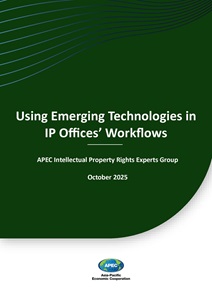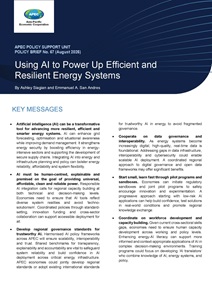
Reports
Using Emerging Technologies in IP Offices’ Workflows
The Asia-Pacific Economic Cooperation (APEC) is a regional economic forum established in 1989 to leverage the growing interdependence of the Asia-Pacific.
The Asia-Pacific Economic Cooperation (APEC) is a regional economic forum established in 1989 to leverage the growing interdependence of the Asia-Pacific.
APEC ensures that goods, services, investment and people move easily across borders. Members facilitate this trade through faster customs procedures at borders; more favorable business climates behind the border; and aligning regulations and standards across the region.
APEC ensures that goods, services, investment and people move easily across borders. Members facilitate this trade through faster customs procedures at borders; more favorable business climates behind the border; and aligning regulations and standards across the region.
APEC works to help all residents of the Asia-Pacific participate in the growing economy.
APEC works to help all residents of the Asia-Pacific participate in the growing economy.
Capacity building projects play an important role in helping translate APEC's goals into reality.
Capacity building projects play an important role in helping translate APEC's goals into reality.

Reports
•August 2025
Download Report
1MB
Published Under
APEC Secretariat, APEC Policy Support Unit
Accessed
938
Pages
13
APEC electricity grids and energy systems are under immense pressure. Rising demand, the shift to variable renewable energy, and more frequent extreme weather events are challenging its legacy infrastructure. Artificial Intelligence (AI) offers a transformative tool to help modernise electricity systems, improve efficiency and strengthen resilience amid these challenges. Drawing on expert interviews from various international organisations, case studies, and regional data, this policy brief showcases practical AI applications already delivering results in optimising grid operations, unlocking energy savings in buildings and industry, and increasing energy market efficiency. It then lays out policy options at the regional and domestic levels to enable AI uptake, integration, and acceptance in energy systems.

